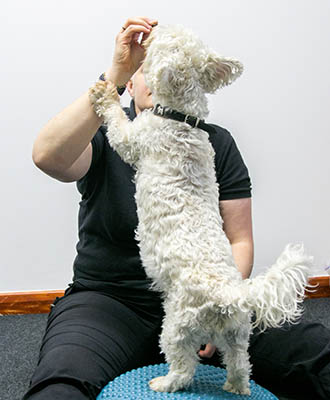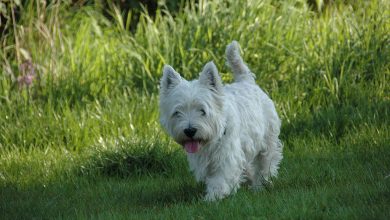Cushing’s Disease: The Journey of a Duchess
Do you know the symptoms of Cushing’s Disease?

Duchess was eight years old when I noticed her stools had become a little erratic. She would go to the toilet three times a day, which was normal for her, but whilst her morning and evening motion where absolutely fine it was a different story at lunchtime! Over a few days it had become slightly soft and runny, she wouldn’t finish in one go, and sometimes it was like jelly. After a week or so of this being everyday (it had started with only once or twice a week) I noticed there was a spot of fresh blood. Although not being too concerned as it is common to have blood in the stool if a dog has diarrhoea through excessive straining, I made Duchess an appointment with our trusted vet, Michael.
Michael gave Duchess a full assessment and suggested a stool sample, this came back all clear…no parasites. The next step was to do a blood test. This time the results came back with some concern. According to the blood results Duchess was seriously ill but strangely that wasn’t what Michael saw when he looked at her, he even called the blood laboratory and asked if these were the right results for Duchess! We were confused as to what was going on, so it was suggested we do some further testing, well obviously both Michael and I wanted to get to the bottom of what was going on. An abdominal ultrasound scan was performed which showed nodules on her adrenal glands (these sit just above the kidneys, one on each side and produce cortisol which is our natural steroid) but still no clinical signs of Cushing’s Disease – fur loss, increased thirst, increased appetite, increased urination, pot belly, lethargy, muscle wasting and panting.
Cushing’s Disease is one of the most commonly diagnosed canine endocrine disorders and is usually seen in older dogs. There are two types, one is caused by a tumour in or on the adrenal gland itself and the other is a growth (not necessarily cancerous) affecting the pituitary gland in the brain which is linked via hormones to the adrenal glands. Thankfully for us Duchess had the latter type, which if you are going to have one it is this one, you’d rather have.
It was also revealed that Duchess had slightly leaky kidneys, so we started her on a very mild kidney medication. Michael also wanted me to put her on a medicated kibble diet for her kidneys, but one look at me and he realised that just wasn’t going to happen. I asked if I could get a referral to a canine nutritionist to take a look at her diet as I’m far happier with the natural approach than synthetic medication, but did agree that if it didn’t work, I would concede defeat and place her on the kibble.
As Duchess was what they term pre-clinical (her blood levels were still low enough), Michael wanted to hold off on treating the Cushing’s Disease for the time being but agreed we would keep a very close eye on her. All in all, after what seemed like a very long three months, we had finally got some answers.

A year went by before Duchess became full blown clinical…Michael was amazed and admitted that he didn’t expect her to be pre-clinical for so long, he agreed that whatever it was that I was doing was working as all her blood results and enzyme levels were coming down so he told me to keep doing what I was doing but that we would now add in medication for the Cushing’s Disease. The medication started and regular tests were conducted to make sure the levels were correct and that there were no side effects of the medication (we now get tested every six months to make sure everything is in check as per the protocols). As we started on the medication road, we hit a few stumbling blocks, mainly I noticed Duchess had become reluctant to go for a walk and when she did it was slow, and I mean slow, slower than a snails’ pace! At first, I thought it was just Duchess being Duchess (her name befits her!) and that with it being cold and damp she just didn’t want to go. I mentioned this to Michael at our next catch up and it transpired Duchess had underlying elbow arthritis. After examination we both suspected that she had had it for years and that the Cushing’s Disease had been hiding it. That’s because Cushing’s Disease is an increase in the cortisol level within the body. Cortisol is produced by the adrenal glands hence the official name of the disease being hyperadrenocorticism. Cortisol is effectively an anti-inflammatory, so with Duchess she was basically getting a high level if anti-inflammatory permanently due to the adrenal glands over producing cortisol and this was masking her arthritis painful.
Now came the tough decision…we didn’t want her in pain so considered reducing her medication, but this would put a strain on her kidneys. There was no point in giving her anti-inflammatories (corticosteroids) and keeping her medication at the correct level as that would be counteracting what we were trying to achieve. At the time golden paste/turmeric paste was becoming highly popular as a natural anti-inflammatory. Michael agreed to me trying this approach and needless to say Duchess was back to her normal lively self within two weeks.
Duchess is now stable on her medication and has regular six-monthly tests, she is off the kidney medication and still on her raw diet.
Along with medication Duchess gets regular treatments from myself to help with the arthritis and stiffness, she still has a good 60-minute run around the park and despite everything will still manage a 5km walk on the South Downs every so often. I vary what she does each day from a walk to specific exercises to keep her muscles strong as weakness especially in the back legs is a side effect of Cushing’s, and hydrotherapy.
Duchess by name Duchess by nature! She is a typical Westie, very much in charge at home. Not only of the four other dogs we have but of us as well but at nearly 14-years of age she’s entitled to be. If she doesn’t want to go for a walk, she will make it very clear…and there is no way of changing her mind. Sometimes it is just best to leave her snuggled in her favourite blanket.






